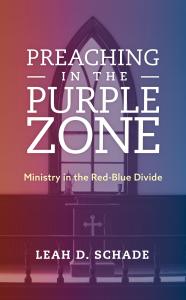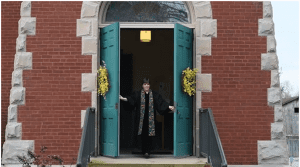Sermons about social issues can be risky. Here are 8 ways to prepare your congregation in the midst of a politically divided culture.

In surveys I conducted of thousands of U.S. mainline Protestant pastors over the past five years about ministry, preaching, and social issues, nearly half of clergy reported receiving negative pushback when preaching sermons about social issues. This pushback takes the form of angry emails or letters as well as direct personal confrontation. Some pastors also report that congregants have withheld financial support, stopped attending worship, withdrew their membership, or called for their resignation.
Yet clergy are called to address the public issues that affect the people of God.
The prophets in the Hebrew scriptures consistently preached truth to power. Jesus spoke publicly about all manner of social issues including taxes, poverty, hunger, the treatment of women, the status of outsiders, the exercise of power, and capital punishment (of which he would become a victim). Also, the apostles engaged in the public square throughout the Mediterranean world that put them at odds with religious and secular leaders alike.
Today, issues such as income inequality, systemic racism, women’s access to healthcare, immigration, and LGBTQIA+ inclusion affect individuals, families, communities, and society at large. These are complicated topics that can benefit from a Christian ethical, biblical, and theological lens.
However, today’s U.S. churches are voluntary organizations with a religious economy that places pressure on clergy who preach sermons about social issues. Preachers know they could fall out of favor with influential laity or otherwise jeopardize their relationships with the people they are called to serve. So how can pastors navigate the “landmines” when preaching sermons about social issues?

To help you prepare your congregation for sermons about social issues, here are 8 ideas adapted from my book, Preaching in the Purple Zone: Ministry in the Red-Blue Divide (Rowman & Littlefield, 2019).
1 – Teach your congregation the biblical examples of how people of faith engaged topics of public concern.
Help them to see that disagreement and conflict are not only part of God’s story with us, but that the Bible itself contains many voices, perspectives, and agendas which sometimes contradict each other. If God is okay with God’s Word having these internal conversations, the church can learn to work with these complicated conversations as well. (See: The Politics of Faith – The Bible, Government, and Public Policy: Book Review.)
2 – Tell your congregation about the church’s history of engaging controversial issues.
Focus especially on your denomination’s history of engagement and the precedent it sets. This will help them understand both the ancient and recent historical context within which your own preaching will take place.
3 – Have preparatory conversations with your congregation’s leadership group (board, council, elders, etc.) before preaching the sermon.
Ask your governing board what concerns they have and what suggestions they can offer for best approaching the subject. Note, this is not to seek their permission but to solicit their guidance. Alert key leadership that you’ll be addressing a sensitive topic so that they are prepared and not caught off guard.
4 – Talk with clergy colleagues about your sermon.
Test-drive the sermon with other preachers and ask for suggestions to finesse the more controversial parts of the sermon. Seeking advice from trusted colleagues can both keep us honest and give us courage.
5 – Consider talking to folks in the congregation ahead of time who you suspect may react negatively to the sermon you will preach.
This is being “wise as serpents and gentle as doves” (Matthew 10:16). Asking for their thoughts about the topic demonstrates that you are willing to listen before you speak. This, in turn, builds trust.
6 – Invite different voices into your sermon preparation – and even into the sermon itself.
Ask people to share their stories, concerns, and questions either formally with prepared remarks or informally during the preaching moment. Those hearing the sermon will get a more well-rounded perspective while allowing you to frame these perspectives and questions both biblically and theologically. (See: Using a “Dialogical Lens” for Scripture and Preaching.)
7 – Be fair and avoid creating “straw men” or taking cheap shots against those who you believe to be on the “wrong” side of an issue.
Acknowledge the complexities of individual human sin as well as systemic evil. Use the sermon to lift up the “big questions” that underlie the headlines or controversies. And then frame them within biblical and theological terms. At the same time, be clear about the behaviors that are not in alignment with the teachings of Christ. Violence, dishonesty, lack of integrity, corruption, abuse, and oppression are not the will of God, and preachers need to be clear about that.
8 – Admit your own struggles with the issue.
Allow yourself to admit your own complicity about a systemic problem. Share about the ways in which your heart and mind changed which helped you see things a different way. Share your humanity even while you maintain distance for prophetic critique.

It’s about building and maintaining relationships
In addition to these suggestions for preparing your congregation for a sermon about social issues, there are other things you can do. Be sure to maintain strong pastoral relationships. Do your homework about a topic so that you’re well-informed. And allow time for dialogue before and after the sermon. When you do these things, you can help build relationships of trust. In turn, your congregation will know that you care about them and your community rather than accusing you of having a “political agenda.”
Even with the best of intentions, however, things can go wrong.
The reality is that disinformation and misinformation are rampant. This, combined with the feedback loop of social media circles and the normalizing of political violence have made it nearly impossible to build bridges across certain political divides. No matter how well-intentioned a pastor may be as they try to preach about social issues in a constructive way, ruptures can still occur. If this is where you find yourself, read this article: “What to do When Parishioners Leave — Because of Politics.”
Ultimately, this work is about personal and congregational integrity while trusting in the power and goodness of God. Ideally, with deep listening and respectful conversation, we can address social issues in preaching and teaching collaboratively. Together with our congregations, we can build and strengthen the Body of Christ.
Read also:
It’s Okay to Be A Progressive Christian. Here’s Why.
Being Theological in a Political World
The Politics of Faith – The Bible, Government, and Public Policy: Book Review

The Rev. Dr. Leah D. Schade is the Associate Professor of Preaching and Worship at Lexington Theological Seminary in Kentucky and ordained in the ELCA. Dr. Schade does not speak for LTS or the ELCA; her opinions are her own. She is the author of Preaching in the Purple Zone: Ministry in the Red-Blue Divide (Rowman & Littlefield, 2019) and Creation-Crisis Preaching: Ecology, Theology, and the Pulpit (Chalice Press, 2015). She is the co-editor of Rooted and Rising: Voices of Courage in a Time of Climate Crisis (Rowman & Littlefield, 2019) and co-wrote Apocalypse When?: A Guide to Interpreting and Preaching Apocalyptic Texts (Wipf & Stock, 2020). Her book, Introduction to Preaching: Scripture, Theology, and Sermon Preparation, co-written with Jerry L. Sumney and Emily Askew, will be released by Rowman & Littlefield in March 2023.













